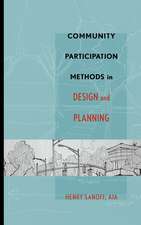Visual Research Methods in Design (Routledge Revivals): Routledge Revivals
Autor Henry Sanoffen Limba Engleză Paperback – 12 ian 2018
| Toate formatele și edițiile | Preț | Express |
|---|---|---|
| Paperback (1) | 260.45 lei 6-8 săpt. | |
| Taylor & Francis – 12 ian 2018 | 260.45 lei 6-8 săpt. | |
| Hardback (1) | 767.07 lei 6-8 săpt. | |
| Taylor & Francis – 3 iun 2016 | 767.07 lei 6-8 săpt. |
Din seria Routledge Revivals
- 9%
 Preț: 801.69 lei
Preț: 801.69 lei - 8%
 Preț: 432.15 lei
Preț: 432.15 lei -
 Preț: 153.81 lei
Preț: 153.81 lei -
 Preț: 230.80 lei
Preț: 230.80 lei -
 Preț: 294.72 lei
Preț: 294.72 lei -
 Preț: 258.72 lei
Preț: 258.72 lei - 9%
 Preț: 764.34 lei
Preț: 764.34 lei - 9%
 Preț: 903.41 lei
Preț: 903.41 lei -
 Preț: 296.10 lei
Preț: 296.10 lei -
 Preț: 342.36 lei
Preț: 342.36 lei - 9%
 Preț: 606.35 lei
Preț: 606.35 lei -
 Preț: 317.54 lei
Preț: 317.54 lei - 9%
 Preț: 764.28 lei
Preț: 764.28 lei -
 Preț: 257.00 lei
Preț: 257.00 lei -
 Preț: 238.40 lei
Preț: 238.40 lei -
 Preț: 259.47 lei
Preț: 259.47 lei - 9%
 Preț: 903.80 lei
Preț: 903.80 lei -
 Preț: 326.26 lei
Preț: 326.26 lei -
 Preț: 258.66 lei
Preț: 258.66 lei -
 Preț: 294.97 lei
Preț: 294.97 lei -
 Preț: 308.89 lei
Preț: 308.89 lei -
 Preț: 199.85 lei
Preț: 199.85 lei -
 Preț: 347.49 lei
Preț: 347.49 lei -
 Preț: 295.04 lei
Preț: 295.04 lei -
 Preț: 389.39 lei
Preț: 389.39 lei -
 Preț: 257.00 lei
Preț: 257.00 lei -
 Preț: 343.21 lei
Preț: 343.21 lei - 9%
 Preț: 640.90 lei
Preț: 640.90 lei - 9%
 Preț: 619.48 lei
Preț: 619.48 lei -
 Preț: 228.88 lei
Preț: 228.88 lei -
 Preț: 257.67 lei
Preț: 257.67 lei -
 Preț: 245.10 lei
Preț: 245.10 lei -
 Preț: 258.52 lei
Preț: 258.52 lei -
 Preț: 258.72 lei
Preț: 258.72 lei -
 Preț: 368.93 lei
Preț: 368.93 lei -
 Preț: 246.37 lei
Preț: 246.37 lei - 9%
 Preț: 832.07 lei
Preț: 832.07 lei -
 Preț: 258.66 lei
Preț: 258.66 lei -
 Preț: 286.98 lei
Preț: 286.98 lei - 18%
 Preț: 695.85 lei
Preț: 695.85 lei - 9%
 Preț: 934.94 lei
Preț: 934.94 lei - 5%
 Preț: 231.22 lei
Preț: 231.22 lei -
 Preț: 267.15 lei
Preț: 267.15 lei -
 Preț: 200.66 lei
Preț: 200.66 lei - 9%
 Preț: 638.61 lei
Preț: 638.61 lei -
 Preț: 259.68 lei
Preț: 259.68 lei - 9%
 Preț: 1038.45 lei
Preț: 1038.45 lei -
 Preț: 389.43 lei
Preț: 389.43 lei -
 Preț: 302.13 lei
Preț: 302.13 lei -
 Preț: 302.25 lei
Preț: 302.25 lei
Preț: 260.45 lei
Preț vechi: 311.66 lei
-16% Nou
Puncte Express: 391
Preț estimativ în valută:
49.84€ • 52.17$ • 41.24£
49.84€ • 52.17$ • 41.24£
Carte tipărită la comandă
Livrare economică 05-19 aprilie
Preluare comenzi: 021 569.72.76
Specificații
ISBN-13: 9781138688421
ISBN-10: 1138688428
Pagini: 243
Dimensiuni: 190 x 240 x 19 mm
Greutate: 0.48 kg
Ediția:1
Editura: Taylor & Francis
Colecția Routledge
Seria Routledge Revivals
Locul publicării:Oxford, United Kingdom
ISBN-10: 1138688428
Pagini: 243
Dimensiuni: 190 x 240 x 19 mm
Greutate: 0.48 kg
Ediția:1
Editura: Taylor & Francis
Colecția Routledge
Seria Routledge Revivals
Locul publicării:Oxford, United Kingdom
Public țintă
Postgraduate, Professional, and UndergraduateCuprins
Preface; Introduction; Chapter 1 Environmental Measurement; Multiple Sorting Landscape Evaluation Paradigms Visual Representation Visual Cues Categorizing Visual Cues Recognition of Building Types Attributes of Residential Environments Characterizing Historic Architecture Photo Interviewing; Chapter 2 Imageability; Contextual Infill Residential Context Best Fit Slide Rule Environmental Character Visual Appraisal Approach Road Planting Signscape Streescape Graphics Streetscape Workshop; Chapter 3 Environmental Mapping; Cognitive Mapping Direct Observation Observing Library Visitors Mapping Schools Observing Children’s Activities Mapping Children’s Activities Tracking Documentary Techniques Photo Streetscapes Transforming Street Scenes Photographically Studying Behaviour Stereoscopic Photography Sonic Mapping; Chapter 4 Visual Notation; Encoding Motation Recording Highway Sequences Townscape Awareness Walks Translation RSVP Cycles Proxemic Behaviour Wayfinding and Notation; Chapter 5 Environmental Simulation; Spaces that connect Simulation Booth Simulation Models Full-scale Modelworkshop Lund Simulator Computer Simulation Computerized User Flow Patterns Virtual Environmental Display Simulation in Context Simulation Games for Information Collection Housing Layout Game; Chapter 6 Planning and Design; Goal Setting in Design Knowledge of Emerging Environmental Preservation Strategies (KEEPS) Space Planning Housing Trade-offs Goal Setting in Education Campsite Design Morphological Method: Continuing Care Center Planning Ballot Housing Assembly Kit Community Library Working Together Design Telethon; References; Index
Descriere
First published in 1991, this book is about applications and issues relating to the visual environment. The content pertains to the understanding of human behaviour in the environment by recording behaviour and actions or by direct interaction with people. The author examines research and planning methods that primarily stress the visual features of the physical environment. Traditionally, environmental research has relied on verbal descriptions and perceptions of the physical environment, virtually ignoring the visual component and the potential application of the social sciences for gathering this data. Various strategies that can expand the visual information base have been explored here









